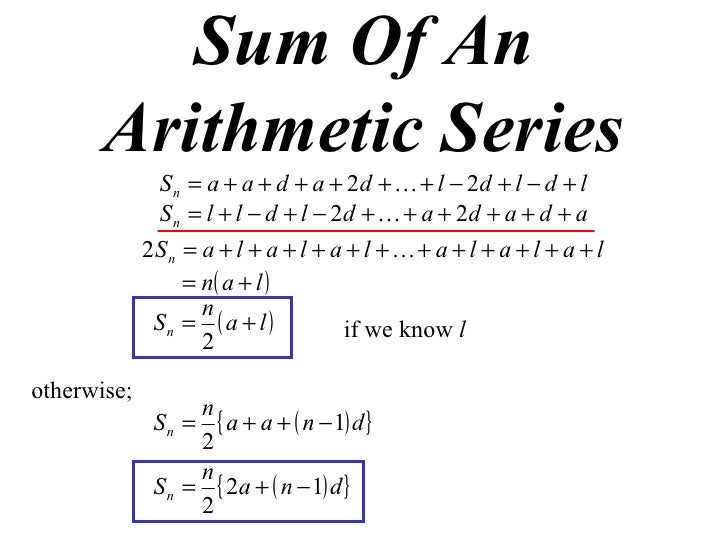
An arithmetic series is a series or summation that sums the terms of an arithmetic sequence. We solve 3 n 14 99 to get n 25.

Learn more about it here.
Sum of an arithmetic series. Sum of arithmetic series. Before I show you how to find the sum of arithmetic series you need to know what an arithmetic series is or how to recognize it. A series is an expression for the sum of the terms of a sequence.
For example 6 9 12 15 18 is a series for it is the expression for the sum of the terms of the sequence 6 9 12 15 18. Arithmetic Sequences and Sums Sequence. A Sequence is a set of things usually numbers that are in order.
Each number in the sequence is called a term or sometimes element or member read Sequences and Series for more details. In an Arithmetic Sequence the difference between one term and the next is a constant. To find the sum of an arithmetic sequence start by identifying the first and last number in the sequence.
Then add those numbers together and divide the sum by 2. Finally multiply that number by the total number of terms in the sequence to find the sum. An arithmetic series is the sum of a sequence a_k k1 2 in which each term is computed from the previous one by adding or subtracting a constant d.
Therefore for k1 a_ka_k-1da_k-22da_1dk-1. Sum of Arithmetic Sequence Formula The Arithmetic series of finite number is the addition of numbers and the sequence that is generally followed include a a d a 2d. And so on where a is the first term d is the common difference between terms.
There are two popular techniques to calculate the sum of an Arithmetic sequence. The sum of the first n terms of an arithmetic sequence is given by. S_nfracn2 2an-1d where the first term is a and the common difference is d.
Alternatively we can write this as. S_nfracn2 aL where L is the last term. Suppose we have a general arithmetic sequence with first term a and common difference d.
The sum of the first n terms of a series is called the n-th partial sum and is often denoted as S n. Find the 35 th partial sum S 35 of the arithmetic sequence with terms a n 12 n 1. The sum of the members of a finite arithmetic progression is called an arithmetic seriesFor example consider the sum.
This sum can be found quickly by taking the number n of terms being added here 5 multiplying by the sum of the first and last number in the progression here 2 14 16 and dividing by 2. In the case above this gives the equation. The sum of an arithmetic series is found by multiplying the number of terms times the average of the first and last terms.
3 7 11 15 99 has a 1 3 and d 4. To find n use the explicit formula for an arithmetic sequence. We solve 3 n 14 99 to get n 25.
Arithmetic sequence is simply the set of objects created by adding the constant value each time while arithmetic series is the sum of n objects in sequence. So the arithmetic sequence calculator finds that specific value which will be equal to the first value plus constant. The series calculator helps to find out the sum of objects of a sequence.
Sum of Arithmetic Sequence Formula The sum of the artithmetic sequence formula is used to calculate the total of all the digits present in an arithmetic progression or series. To recall arithmetic series of finite arithmetic progress is the addition of the members. The sum of the first n terms in an arithmetic sequence is n2a₁aₙ.
It is called the arithmetic series formula. Learn more about it here. C Program for sum of arithmetic series C Server Side Programming Programming Given with afirst term dcommon difference and n number of values in a string and the task is to generate the series and thereby calculating their sum.
S n n a 1 a n 2 where n is the number of terms a 1 is the first term and a n is the last term. The sum of the first n terms of an arithmetic sequence is called an arithmetic series. Sn n22a n 1 d Tn term of AP.
Tn a n 1 d. C Program to find Sum of Arithmetic Progression Series Example. This Program allows the user to enter the first value the total number of elements in a series and the common difference.
Next it will find the sum of the Arithmetic Progression Series. An arithmetic series is a series or summation that sums the terms of an arithmetic sequence. There are methods and formulas we can use to find the value of an arithmetic series.
Understanding arithmetic series can help to understand geometric series and both concepts will be used when learning more complex Calculus topics. Where the last equality results of the expression for the sum of a geometric series. Finally dividing through by 1 r gives the result.
If 1 r 1 then the sum S of the arithmeticogeometric series that is to say the sum of all the infinitely many terms of the progression is given by.